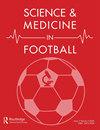Decision-making practice during coaching sessions in elite youth football across European countries
IF 3.5
2区 医学
Q1 SPORT SCIENCES
引用次数: 27
Abstract
ABSTRACT We examined the practice activities employed by 53 youth football coaches working in youth academy professional top-division clubs from England, Germany, Portugal, and Spain. This is the first study to explore the microstructure of coach-led practice in elite youth football across multiple countries. A total of 83 practice sessions from under-12 to under-16 age groups was collected in situ. Sessions were analysed for the proportion of time in ‘non-active decision-making’ (e.g., unopposed technical or tactical skills practices, fitness training) and ‘active decision-making’ activities (e.g., small-sided games, skills practice with opposition), with the latter deemed superior for the transfer of game intelligence skill to match play. More time was spent in active decision-making (M = 62%) compared to non-active decision-making activities (M = 20%) and transitioning between activities (M = 17%). Players from Portugal and Spain spent a higher amount of time in active decision-making activities compared to English and German players, whereas, English players spent more time in unopposed technical-based drills and German players in improving fitness aspects of the game without the ball. Findings extend previous research assessing coach-led youth football practice in single countries by demonstrating differences in training activities between countries in Europe.在整个欧洲国家的精英青年足球教练会议上的决策练习
摘要:我们调查了来自英格兰、德国、葡萄牙和西班牙的53名青年足球教练在青年学院职业顶级俱乐部的实践活动。这是第一项探索多个国家精英青年足球教练主导实践微观结构的研究。现场收集了从12岁以下到16岁以下年龄组的83次练习。分析了“非主动决策”(如无对手的技术或战术技能练习、体能训练)和“主动决策”活动(如小规模比赛、与对手的技能练习)的时间比例,后者被认为在将游戏智力技能转移到比赛中更优。与非主动决策活动(M=20%)和活动之间的过渡(M=17%)相比,主动决策(M=62%)花费的时间更多。与英国和德国球员相比,来自葡萄牙和西班牙的球员在积极决策活动中花费的时间更多,而英国球员在无对手的技术训练和德国球员在无球比赛中提高体能方面花费的时间则更多。研究结果通过证明欧洲国家之间训练活动的差异,扩展了先前评估单个国家教练领导的青少年足球实践的研究。
本文章由计算机程序翻译,如有差异,请以英文原文为准。
求助全文
约1分钟内获得全文
求助全文

 求助内容:
求助内容: 应助结果提醒方式:
应助结果提醒方式:


